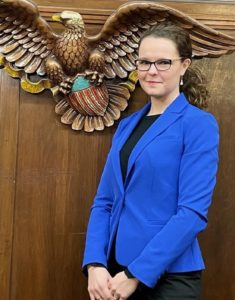A Caldwell County assistant district attorney and Caldwell County Sheriff’s Office investigator recently served as panelists at a statewide training focusing on sexual assault cold case prosecution.
ADA Jennifer C. Mathews of the Caldwell County District Attorney’s Office and Detective Roger Crosby of the Caldwell County Sheriff’s Office spoke as panelists at a training session hosted by the North Carolina Department of Justice (NCDOJ) on November 2-3, 2023, in Raleigh, North Carolina. The training, entitled “Bringing Justice to Cold Case Sexual Assault Survivors,” addressed the use of DNA evidence obtained from previously untested sexual assault kits to bring resolutions to these cold cases.
ADA Mathews and Detective Crosby spoke on a panel alongside members of the North Carolina State Bureau of Investigation (NCSBI) and State Crime Lab (NCSCL), sharing best practices with law enforcement officers and assistant district attorneys about ways to investigate and prepare sexual assault cases for trial that have been dormant for a period of time.
In 2022, Detective Crosby and ADA Mathews successfully prosecuted a 2016 sexual assault cold case that had ties to a more recent 2021 case of a similar nature for the same defendant.
ADA Mathews and Detective Crosby were invited to serve as panelists for the NCDOJ presentation based upon that successful case and were honored to discuss the techniques used in Caldwell County. A vital piece of evidence from the 2016 case was discovered in 2021 as part of North Carolina’s 2019 sexual assault kit initiative (SAKI).
A 2019 inventory search revealed more than 15,000 untested sexual assault kits were being housed at law enforcement agencies statewide. Kits dating back to the 1970s were housed untested for a variety of reasons. In 2019, the N.C. General Assembly worked with NCDOJ and NCSCL to obtain funding to accept and analyze previously untested kits.
Testing of the older kits accomplishes several goals, including: 1) identifying offenders in cases where leads are exhausted and DNA evidence is the best or only opportunity to learn the offender’s identity; and 2) enabling law enforcement agencies to link serial offenders by uncovering previously unknown linked cases. This brings much deserved justice to North Carolina citizens.
Throughout 2020 and 2021, elected district attorneys and their representatives created Multidisciplinary Teams (MDT) in each district to locate untested kits. The MDT in Caldwell County included representatives from Caldwell County Sheriff’s Office, Granite Falls Police Department, Hudson Police Department, Lenoir Police Department and ADA Mathews from the District Attorney’s Office. The Caldwell County MDT identified about 100 kits for testing under the new guidelines. The Caldwell County MDT transported theses qualifying kits to the lab, and DNA results in these cold cases are coming back now.
The Caldwell County DA’s Office has successfully prosecuted one such cold case already. Detective Crosby received a DNA result from a 2016 cold case matching a 2021 active case, tying together a serial offender with other previously unknown closed cases. The 2016 investigation was re-opened. Along with the DNA results, both investigations showed a similar pattern in the defendant’s behavior. The combined investigation and prosecution resulted in the defendant’s second-degree forcible rape conviction for the 2016 case, and second-degree forcible sexual offense and involuntary servitude convictions for the 2021 case. The defendant is now serving prison sentences in the North Carolina Department of Adult Corrections.
ADA Mathews noted that each time there is a positive DNA hit, cases are examined to see what can be done with the new information. This process engages law enforcement, prosecutors and victims in the process.
“When a case can be reopened to bring justice for cold case victims, our community partners are responsive to provide resources to move forward,” she said. “I commend our law enforcement agencies and community partners for coming together as the MDT identified, located, screened and transported so many kits during the COVID-19 pandemic. I appreciate victims and survivors coming forward, and law enforcement officers dedicating resources to solve these cold cases. We want to be sensitive to our victims and work with them to see what is the best way to move ahead with their cases.”

